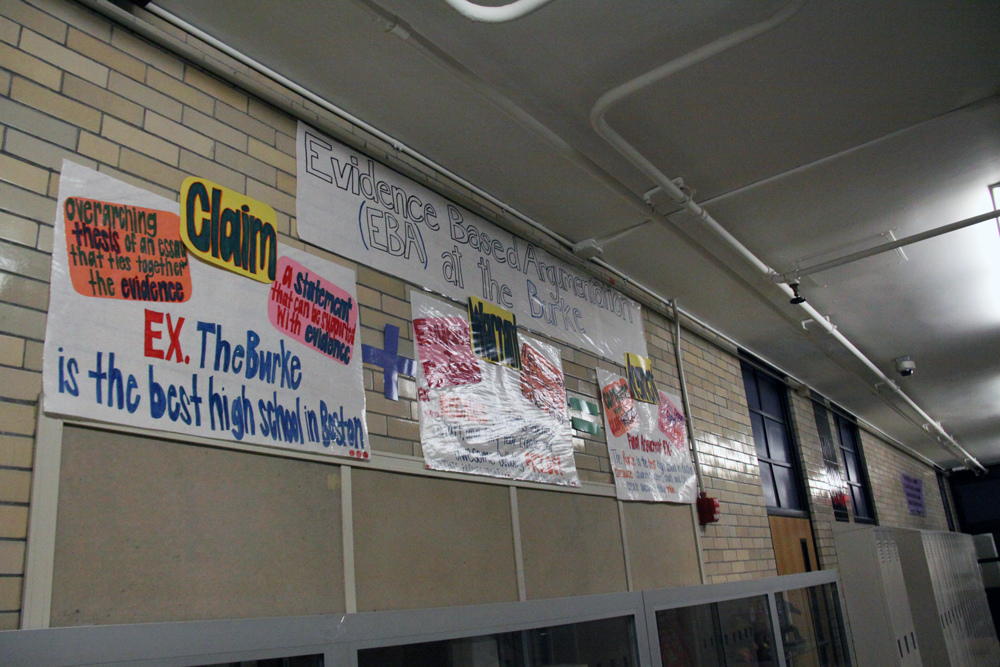
Jeremiah Burke High School Principal Lindsa McIntyre doubts whether new standards known as Common Core will improve student outcomes. "I'm not really sure if it's going to do what it needs to do or not," she says. (WGBH/Kirk Carapezza)
Part two of a two-part series on the new Common Core standards, focusing on a low-performing school in Boston's Dorchester neighborhood. (Read the first piece in the series.)
It's Friday morning, and students pack into a second-floor studio for dance class at Jeremiah Burke High School in Dorchester.
For many students, this class is a good opportunity to blow off some steam after a long week. Principal Lindsa McIntyre says many of these young teenagers live in poor neighborhoods, and some have experienced violence.
"As a result of that, they come with this disbelief in their ability to be successful or their ability to be a productive member of a 21st century society," she said.
Four years ago, the state designated the Burke as an under-performing school. Its dropout rate was too high, and too many students failed the state's standardized tests.
Since then, teachers at the Burke have been trying to improve its performance and build a safe environment. The metal detector still operating and humming at the front of the school is largely seen as a relic.

At Jeremiah Burke High School in Dorchester, signs hang on the walls illustrating new curriculum. (WGBH/Kirk Carapezza)
There’s also a renewed focus on safety and attendance. McIntyre says teachers still go door-to-door, asking why students are absent. And while they’ve made gains, their “sense of urgency is still alive and well,” she said.
“Somebody promised a long time ago that the students here were entitled to a free and appropriate education," McIntyre said. "Somebody promised that they were entitled to this opportunity to learn next to their peers regardless of their color, their circumstances or their being. And so our responsibility is to honor and hold that challenge.”
Now, looking into that future, the Burke is facing another challenge: developing new curriculum.
That’s because Massachusetts is one of 45 states that have adopted new Common Core standards that set out what students from kindergarten through 12th grade should know in English and math.
The standards will lift schools like the Burke out of their academic slumps, increasing the number of students who are ready for college and careers, supporters say. It’s all designed to lift the country's achievement scores, erase stagnant gaps between disadvantaged and advantaged students.
In some classes at the Burke, teachers are already exploring some of the new standards that require collaboration, persuasive argument and critical thinking. But McIntyre isn't confident these new standards are the answer.
"I'm not really sure if it's going to do what it needs to do or not," she said. "It's costly. I know that it's coming and I know that we're getting ready for it to be here."
As schools get ready, some of the loudest critics of the Common Core are based here in Boston. Jim Stergios, executive director of Pioneer Institute, a Boston-based think tank that focuses on education, says the new standards will only increase inequality and achievement gaps.
"There will be some schools that will continue to push forward because they know that their kids, in order to get into Harvard, will need to do that," he said. "But now we have the haves and the have-nots."
Stergios believes the new standards are worse than the state's current MCAS standards, and he worries parents in Massachusetts don't fully understand what the new standards will mean in the classroom.
“I don’t see how pushing back expectations is a higher standard," he said. "I don’t see how that prepares you better for community college or a state college experience.”
"We are in a wait-and-see mode," said Richard Freeland, the state's commissioner of higher education. As Massachusetts determines its final standards, Freeland says he's confident Common Core will provide continuity across state lines.
"The whole goal of this project is to develop a standard at the 11th-grade level which will really reflect readiness to do college-level work," he said.
Right now, Freeland says, the state's biggest problem is that so many young people meet the current MCAS standards, but they still end up in remedial education.
“In our community colleges, that's as many as 65 percent of the students," he said. "It's somewhat smaller at the state universities."
At the Burke in Dorchester, English teacher Maria Depina has already started to integrate Common Core standards, which focus on more nonfiction texts and, she says, will better prepare her students.
“We have to teach students how to use strong evidence and analyzing author’s choice as a way to get them ready for college and career,” she said.
Depina says most of her students, though, are just worried about their report cards.
“The students know we have new standards, but I think one thing I’ve noticed is that they’re more concerned about the grades,” she said.
Across the hall, it's quiet as a handful of students file into a college prep class. Many of the seats are empty. As the class begins, some students sink in their chairs, their heads fall on their desks. College and university pennants from Northeastern, Stonehill and Bowdoin hang on the walls, seemingly out of reach.
This story was co-produced with the education news organization The Hechinger Report.










